Blog
Getting Rid of Foot Odor
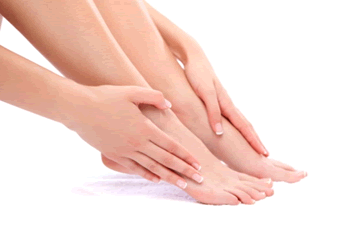 If you have stinky feet, that means it’s time to start investing in a foot care regime, as your feet are suffering from a combination of sweat and bacteria. Make sure to wash your feet thoroughly, including in between the toes. A pumice stone is ideal for helping to remove any dirt or dead skin. Properly dry your feet, as moisture “can lead to the growth of fungus and bacteria.” Trim your toenails straight across, choose comfortable shoes made from breathable leather, alternate and wash your shoes on a regular basis, and opt for cotton socks. You can also use at-home ingredients such as cornstarch or apple cider vinegar to apply to your feet to remove sweat and bacteria.
If you have stinky feet, that means it’s time to start investing in a foot care regime, as your feet are suffering from a combination of sweat and bacteria. Make sure to wash your feet thoroughly, including in between the toes. A pumice stone is ideal for helping to remove any dirt or dead skin. Properly dry your feet, as moisture “can lead to the growth of fungus and bacteria.” Trim your toenails straight across, choose comfortable shoes made from breathable leather, alternate and wash your shoes on a regular basis, and opt for cotton socks. You can also use at-home ingredients such as cornstarch or apple cider vinegar to apply to your feet to remove sweat and bacteria.
Every day foot care is very important, especially for those that are lacking the proper foot care resources. For more information about everyday foot care, consult with one of our podiatrists of University Foot and Ankle Center, L.L.C. Our doctors will attend to all of your podiatric needs.
Every Day Foot Care
Often, people take care of their bodies, face and hair more so than they do for their feet. But the feet are a very important aspect of our bodies, and one that we should pay more attention to. After all, without our feet, we would not be able to perform most daily tasks. It is best to check your feet regularly to make sure there are no new bruises or cuts that you may not have noticed before, for example.
For dry feet, moisturizer can easily be a remedy and can be applied as often as necessary to the affected areas. Wearing shoes that fit well can also help you maintain good foot health, as well as making it easier to walk and do daily activities without the stress or pain of ill-fitting shoes, high heels, or even flip flops.
Also, wearing clean socks with closed shoes is important to ensure that sweat and bacteria do not accumulate within the shoe. Clean socks help to prevent athlete’s foot, fungi problems, bad odors, and can absorb sweat.
If you have any questions please feel free to contact our offices located in East Brunswick and Monroe Township, NJ. We offer the newest diagnostic tools and technology to treat your foot and ankle needs.
Read more about Everyday Foot Care
Kris Bryant Suffers Ankle Sprain After Running Bases
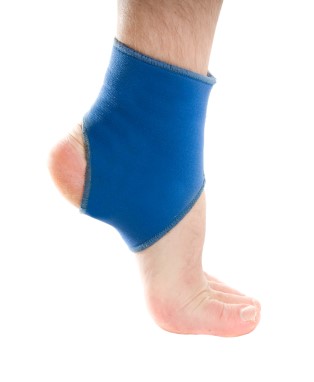 Kris Bryant, third baseman for the Chicago Cubs, suffered a mild ankle sprain in late April. Although the 24 year old did not make the disabled list, he had an MRI done on the ankle, which indicated that the injury was not severe. Bryant sustained the injury while running from first base to home base. He was able to play one more inning, then had to be replaced by Javier Baez.
Kris Bryant, third baseman for the Chicago Cubs, suffered a mild ankle sprain in late April. Although the 24 year old did not make the disabled list, he had an MRI done on the ankle, which indicated that the injury was not severe. Bryant sustained the injury while running from first base to home base. He was able to play one more inning, then had to be replaced by Javier Baez.
Ankle sprains are common, but need immediate attention.If you have any concerns about your feet or ankles, consult with one of our podiatrists of University Foot and Ankle Center, L.L.C. Our doctors will attend to all of your podiatric needs.
How Does an Ankle Sprain Occur?
Ankle sprains take place when the ligaments in your ankle are torn or stretched beyond their limits. There are multiple ways that the ankle can become injured, including twisting or rolling over onto your ankle, putting undue stress on it, or causing trauma to the ankle itself.
What are the Symptoms?
- Mild to moderate bruising
- Limited mobility
- Swelling
- Discoloration of the skin (depending on severity)
Preventing a Sprain
- Wearing appropriate shoes for the occasion
- Stretching before exercises and sports
- Knowing your limits can aid in prevention
Treatment of a Sprain
Treatment of a sprain depends on the severity. Many times, people are told to rest and remain off their feet completely, while others are given an air cast. If the sprain is very severe, surgery may be required.
If you have suffered an ankle sprain previously, you may want to consider additional support such as a brace and regular exercises to strengthen the ankle.
If you have any questions please feel free to contact our offices located in East Brunswick and Monroe Township, NJ. We offer the newest diagnostic tools and technology to treat your foot and ankle needs.
Diet is Important for Managing Your Arthritis Condition
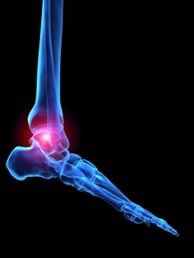 Arthritis is a condition that can lead to the eventual disability of movement in your joints. However, diet plays an important role in minimizing the progression of arthritis symptoms. When choosing foods, opt for meals that have omega-3 fatty acids and antioxidants, which have anti-inflammatory properties. Avoid foods that are high in processed sugars and trans fats.
Arthritis is a condition that can lead to the eventual disability of movement in your joints. However, diet plays an important role in minimizing the progression of arthritis symptoms. When choosing foods, opt for meals that have omega-3 fatty acids and antioxidants, which have anti-inflammatory properties. Avoid foods that are high in processed sugars and trans fats.
Arthritis can be a difficult condition to live with. If you are seeking treatment,consult with one of our podiatrists of University Foot and Ankle Center, L.L.C. Our doctors will attend to all of your podiatric needs.
Arthritic Foot Care
Arthritis is a joint disorder that involves inflammation of different joints in your body, such as in your feet. Arthritis is often caused by a degenerative joint disease and causes mild to severe pain in all affected areas. On top of this, swelling and stiffness in the affected joints can also be a common symptom of arthritis.
In many cases, wearing ill-fitting shoes can worsen the effects and pain of arthritis. Wearing shoes that have a lower heel and extra room can help your feet feel more comfortable. In cases of rheumatoid arthritis, the arch in your foot may become problematic. Buying shoes with proper arch support that contour to your feet can help immensely.
Alleviating Arthritic Pain
- Exercises that stretch the foot can prevent further pain and injury and increase mobility
- Most of the pain can be alleviated with anti-inflammatory drugs, heat, and topical medications
- Massages can help to temporarily alleviate pain.
It is best to see your doctor for the treatment that is right for your needs and symptoms. Conditions vary, and a podiatrist can help you determine the right method of care for your feet.
If you have any questions please feel free to contact our offices located in East Brunswick and Monroe Township, NJ. We offer the newest diagnostic tools and technology to treat your foot and ankle needs.
Understanding Ingrown Toenails
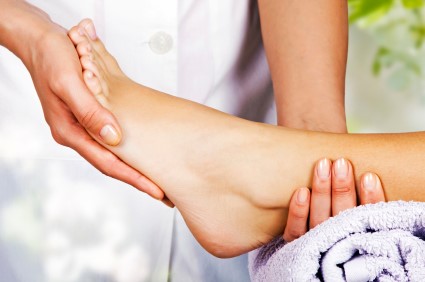 Ingrown toenails occur when a toenail grows out into surrounding skin, leading to pain and swelling. Ingrown toenails can affect anyone, and are caused by incorrectly cutting your nails, toenails growing out irregularly, ill-fitting footwear, improper foot hygiene, or the thickening of your nails. Avoid cutting your toenails in a curved shape by cutting straight across, invest in proper footwear that has enough room for the toes to wiggle, clean your feet often, and inspect your feet to understand why your toenails have thickened.
Ingrown toenails occur when a toenail grows out into surrounding skin, leading to pain and swelling. Ingrown toenails can affect anyone, and are caused by incorrectly cutting your nails, toenails growing out irregularly, ill-fitting footwear, improper foot hygiene, or the thickening of your nails. Avoid cutting your toenails in a curved shape by cutting straight across, invest in proper footwear that has enough room for the toes to wiggle, clean your feet often, and inspect your feet to understand why your toenails have thickened.
Ingrown toenails can become painful if they are not treated properly. For more information about ingrown toenails, consult with one of our podiatrists of University Foot and Ankle Center, L.L.C. Our doctors will attend to all of your podiatric needs.
Ingrown Toenails
Ingrown toenails occur when a toenail grows sideways into the bed of the nail, causing pain, swelling, and possibly infection.
Causes
- Bacterial infections
- Improper nail cutting such as cutting it too short or not straight across
- Trauma to the toe, such as stubbing, which causes the nail to grow back irregularly
- Ill-fitting shoes that bunch the toes too close together
- Genetic predisposition
Prevention
Because ingrown toenails are not something found outside of shoe-wearing cultures, going barefoot as often as possible will decrease the likeliness of developing ingrown toenails. Wearing proper fitting shoes and using proper cutting techniques will also help decrease your risk of developing ingrown toenails.
Treatment
Ingrown toenails are a very treatable foot condition. In minor cases, soaking the affected area in salt or antibacterial soaps will not only help with the ingrown nail itself, but also help prevent any infections from occurring. In more severe cases, surgery is an option. In either case, speaking to your podiatrist about this condition will help you get a better understanding of specific treatment options that are right for you.
If you have any questions please feel free to contact our offices located in East Brunswick and Monroe Township, NJ. We offer the newest diagnostic tools and technology to treat your foot and ankle needs.
Removing Your Corns and Calluses
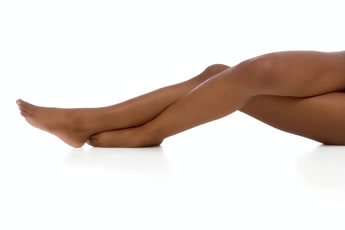 Corns and calluses are defined as “thickened areas of skin [which] form as a result of friction or pressure on the skin,” according to the American Academy of Dermatology. Corns and calluses develop to protect the skin, and often develop on the feet and toes. Treating your corns and calluses involves soaking them in warm water so they soften, then using a pumice stone to file them in a moderate manner, applying moisturizer that preferably has salicylic acid, urea, or ammonium lactate, and then using pads to cover and protect your filed corns and calluses.
Corns and calluses are defined as “thickened areas of skin [which] form as a result of friction or pressure on the skin,” according to the American Academy of Dermatology. Corns and calluses develop to protect the skin, and often develop on the feet and toes. Treating your corns and calluses involves soaking them in warm water so they soften, then using a pumice stone to file them in a moderate manner, applying moisturizer that preferably has salicylic acid, urea, or ammonium lactate, and then using pads to cover and protect your filed corns and calluses.
If you have any concerns about your feet and ankles consult with one of our podiatrists of University Foot and Ankle Center, L.L.C. Our doctors will attend to all of your podiatric needs.
Corns: What are they? And how do you get rid of them?
Corns can be described as areas of the skin that have thickened to the point of becoming painful or irritating. They are often layers and layers of the skin that have become dry and rough, and are normally smaller than calluses.
Ways to Prevent Corns
There are many ways to get rid of painful corns such as wearing:
- Well-fitting socks
- Comfortable shoes that are not tight around your foot
- Shoes that offer support
Treating Corns
Treatment of corns involves removing the dead skin that has built up in the specific area of the foot. Salicylic acid can help in getting rid of these corns because it dissolves keratin, which is the protein that makes up a good majority of corns. Podiatrists recommend that people with diabetes not use salicylic acid but should consult with their podiatrist regarding the treatment of corns.
If you have any questions please feel free to contact our offices located in East Brunswick and Monroe Township, NJ. We offer the newest diagnostic tools and technology to treat your foot and ankle needs.
Hyperhidrosis, the Excessive Sweating Disorder
 Although sweating is a natural process of our bodies, excessive sweating, called hyperhidrosis, is a health condition that can be detrimental to our everyday lives. Hyperhidrosis can affect parts of the body such as the hands and feet. Sweating occurs to help hydrate the skin and to “maintain the body’s balance of fluids,” removing salts and electrolytes. Sweating can often be triggered by exercise but it can also be triggered by nervousness. Excessive sweating can happen to anyone, at any time, anywhere. The best solution for treating hyperhidrosis is to consult your doctor.
Although sweating is a natural process of our bodies, excessive sweating, called hyperhidrosis, is a health condition that can be detrimental to our everyday lives. Hyperhidrosis can affect parts of the body such as the hands and feet. Sweating occurs to help hydrate the skin and to “maintain the body’s balance of fluids,” removing salts and electrolytes. Sweating can often be triggered by exercise but it can also be triggered by nervousness. Excessive sweating can happen to anyone, at any time, anywhere. The best solution for treating hyperhidrosis is to consult your doctor.
If you are suffering from hyperhidrosis consult with one of our podiatrists of University Foot and Ankle Center, L.L.C. Our doctors will attend to all of your podiatric needs.
Hyperhidrosis of the Feet
Hyperhidrosis is a rare disorder that can cause people to have excessive sweating of their feet. This can usually occur all on its own without rigorous activity involved. People who suffer from hyperhidrosis may also experience sweaty palms.
Although it is said that sweating is a healthy process meant to cool down the body temperature and to maintain a proper internal temperature, hyperhidrosis may prove to be a huge hindrance on a person’s everyday life.
Plantar hyperhidrosis is considered to be the main form of hyperhidrosis. Secondary hyperhidrosis can refer to sweating that occurs in areas other than the feet or hands and armpits. Often this may be a sign of it being related to another medical condition such as menopause, hyperthyroidism and even Parkinson’s disease.
In order to alleviate this condition, it is important to see your doctor so that they may prescribe the necessary medications so that you can begin to live a normal life again. If this is left untreated, it is said that it will persist throughout an individual’s life.
A last resort approach would be surgery, but it is best to speak with your doctor to find out what may be the best treatment for you.
If you have any questions please feel free to contact our offices located in East Brunswick and Monroe Township, NJ. We offer the newest diagnostic tools and technology to treat your foot and ankle needs.
Impact Loading on Our Feet Is Affected As We Age
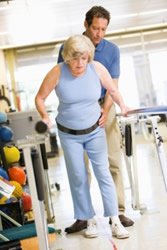 For Mackie Shilstone, running at an older age means taking into account several factors that affect ability and performance. Shilstone discovered a study conducted by East Carolina University, the U.S. Army Institute for Environmental Medicine, and the Wake Forest University in 2015, which found that “as age increased, stride length and running velocity decreased.” This could be due to the fact that the ankle muscles and joints in older runners are not able to “withstand the impact stresses of running, especially in individuals running more frequently.” Training your ankles is important in ensuring that your feet are able to function properly as you age.
For Mackie Shilstone, running at an older age means taking into account several factors that affect ability and performance. Shilstone discovered a study conducted by East Carolina University, the U.S. Army Institute for Environmental Medicine, and the Wake Forest University in 2015, which found that “as age increased, stride length and running velocity decreased.” This could be due to the fact that the ankle muscles and joints in older runners are not able to “withstand the impact stresses of running, especially in individuals running more frequently.” Training your ankles is important in ensuring that your feet are able to function properly as you age.
Proper foot care is something many older adults forget to consider. If you have any concerns about your feet and ankles consult with one of our podiatrists of University Foot and Ankle Center, L.L.C. Our doctors will attend to all of your podiatric needs.
The Elderly and their Feet
As we age we start to notice many changes in our body, but the elder population may not notice them right away. Medical conditions may prevent the elderly to take notice of their foot health right away. Poor vision is a lead contributor to not taking action for the elderly.
Common Conditions
Neuropathy – can reduce feeling in the feet, and can hide many life threating medical conditions.
Reduced flexibility – prevents the ability of proper toenail trimming, and foot cleaning. If left untreated, it may lead to further medical issues.
Foot sores – amongst the older population can be serious before they are discovered. Some of the problematic conditions they may face are:
Gouging toenails affecting nearby toe
Shoes that don’t fit properly
Pressure sores
Loss of circulation in legs & feet
Edema & swelling of feet and ankles
Susceptible Infections
Diabetes and poor circulation can cause general loss of sensitivity over the years, turning a simple cut into a serious issue.
If you have any questions please feel free to contact our offices located in East Brunswick and Monroe Township, NJ. We offer the newest diagnostic tools and technology to treat your foot and ankle needs.
5 Foot Problems that Arise from Wearing High Heels
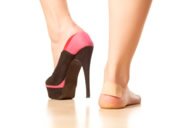 Many different issues can result from wearing high heels for too long. These issues include the forming of bunions, which are growths caused by improper alignment of the toe joints. Hammertoes can also be caused by high heels, which are characterized as bent toes that are caused by friction. Constant pressure and friction on your toes can lead to other conditions such as tailor’s bunions, or small bunions formed near your pinkie toe, pump bumps or pain in the heels, and metatarsalgia or the inflammation of the balls of your feet.
Many different issues can result from wearing high heels for too long. These issues include the forming of bunions, which are growths caused by improper alignment of the toe joints. Hammertoes can also be caused by high heels, which are characterized as bent toes that are caused by friction. Constant pressure and friction on your toes can lead to other conditions such as tailor’s bunions, or small bunions formed near your pinkie toe, pump bumps or pain in the heels, and metatarsalgia or the inflammation of the balls of your feet.
High heels have a history for causing foot and ankle problems. If you have any concerns about your feet consult with one of our podiatrists of University Foot and Ankle Center, L.L.C. Our doctors will attend to all of your podiatric needs.
Effects of High Heels on the Feet
High heels are popular shoes among women because their style and societal appeal. Despite this, they can still cause many health problems if worn too frequently.
What parts my body will be affected by high heels?
- Ankle Joints
- Achilles Tendon – may shorten and stiffen with prolonged wear
- Balls of the Feet
- Knees – heels cause the knees to bend constantly, creating stress on them
- Back – they decrease the spine’s ability to absorb shock, which may lead to back pain. Also, the vertebrae of the lower back may compress.
What kinds of foot problems can develop from wearing high heels?
- Corns
- Calluses
- Hammertoe
- Bunions
- Morton’s Neuroma
- Plantar Fasciitis
How can I still wear high heels and maintain foot health?
If you want to wear high heeled shoes, make sure that you are not wearing them every day, as this will help prevent long term physical problems. Try wearing thicker heels as opposed to stilettos to distribute weight more evenly across the feet. Always make sure you are wearing the proper shoes for the right occasion, such as sneakers for exercising. If you walk to work, try carrying your heels with you and changing into them once you arrive at work. Adding inserts to your heels can help cushion your feet and absorb shock. Full foot inserts or metatarsal pads are available.
If you have any questions please feel free to contact our offices located in East Brunswick and Monroe Township, NJ. We offer the newest diagnostic tools and technology to treat your foot and ankle needs.
Thyme Ingredient Found in VapoRub Product Reportedly Treats Toenail Fungus
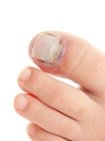 If you have toenail fungus and find that pharmacy medications are just too costly, good news, there is one inexpensive option to consider. According to a study conducted in 2009, the thyme extract in the Vicks VapoRub product helped treat and cure toenail fungus. Thymol, the ingredient “which is naturally found in the herb thyme,” had antifungal properties which helped fight against toenail fungus. If you’d like to try Vicks VapoRub or thyme essential oil on your toenail fungus, make sure to trim, wash, and dry your toenail first before application.
If you have toenail fungus and find that pharmacy medications are just too costly, good news, there is one inexpensive option to consider. According to a study conducted in 2009, the thyme extract in the Vicks VapoRub product helped treat and cure toenail fungus. Thymol, the ingredient “which is naturally found in the herb thyme,” had antifungal properties which helped fight against toenail fungus. If you’d like to try Vicks VapoRub or thyme essential oil on your toenail fungus, make sure to trim, wash, and dry your toenail first before application.
While toenail fungus is troublesome to eradicate, doing so is not impossible. If you have any concerns with your feet consult with one of our podiatrists of University Foot and Ankle Center, L.L.C. Our doctors will attend to all of your podiatric needs.
Toenail Fungus Treatment
Toenail fungus is a problem which affects many people and is hard to get rid of. Fortunately, there are several methods to go about treating toenail fungus.
Antibiotics & Treatments
Lamisil – is the most commonly effective treatment for toenail fungus. It is available as an antibiotic Terbinafine tablet and cream. Terbinafine is a chemical component which kills fungal growth on the body. Applying regular doses will gradually kill the fungal growth. It is important to keep the area clean and air free.
Talcum powder – applying powder on the feet and shoes helps keep the feet free of moisture and sweat.
Sandals or open toed shoes – wearing these will allow air movement and help keep feet dry. They also expose your feet to light, which fungus cannot tolerate. Socks with moisture wicking material also help as well
Alternative Treatments
There are always surgical procedures that are available for toenail fungus. Some people would like immediate quick removal of toenail fungus. Surgeons will be able to cut through and remove the growth using laser surgery. It is important not to try and remove it yourself. Once removed, your old shoes will need to be replaced to avoid reinfection.
If you have any questions please feel free to contact our offices located in East Brunswick and Monroe Township, NJ. We offer the newest diagnostic tools and technology to treat your foot and ankle needs.
New Guidelines Center on Treating Diabetic Feet
 The Society for Vascular Surgery and the American Podiatric Medical Association have collaborated together to “develop a clinical practice guideline for the care of feet in people with diabetes.” The guidelines focus on the prevention of diabetic foot ulcers, off-loading, osteomyelitis, and peripheral arterial disease. The guidelines suggest centering prevention around diabetic foot ulcers, with patients visiting their podiatrists or doctors often, especially if they have peripheral neuropathy, the loss of sensation. It’s important for patients and their families to be educated and to maintain and control diabetic feet problems.
The Society for Vascular Surgery and the American Podiatric Medical Association have collaborated together to “develop a clinical practice guideline for the care of feet in people with diabetes.” The guidelines focus on the prevention of diabetic foot ulcers, off-loading, osteomyelitis, and peripheral arterial disease. The guidelines suggest centering prevention around diabetic foot ulcers, with patients visiting their podiatrists or doctors often, especially if they have peripheral neuropathy, the loss of sensation. It’s important for patients and their families to be educated and to maintain and control diabetic feet problems.
Diabetic foot care is important in preventing foot ailments such as ulcers. If you are suffering from diabetes or have any other concerns about your feet consult with one of our podiatrists of University Foot and Ankle Center, L.L.C. Our doctors will attend to all of your podiatric needs.
Diabetic Foot Care
Diabetes affects millions of people every year. Diabetes can damage blood vessels in many parts of the body, including the feet. Because of this, taking care of your feet is essential if you have diabetes, and having a podiatrist help monitor your foot health is highly recommended.
The Importance of Caring for Your Feet
- Routinely inspect your feet for bruises or sores.
- Wear socks that fit your feet comfortably.
- Wear comfortable shoes that provide adequate support.
Patients with diabetes should have their doctor monitor their blood levels because blood sugar levels play such a huge role in diabetic care. Monitoring these levels on a regular basis is highly advised.
It is always best to inform your healthcare professional of any concerns you may have regarding your feet, especially for diabetic patients. Early treatment and routine foot examinations are keys to maintaining proper health, especially because severe complications can arise if proper treatment is not applied.
If you have any questions please feel free to contact our offices located in East Brunswick and Monroe Township, NJ. We offer the newest diagnostic tools and technology to treat your foot and ankle needs.
Blog Archives
- May 2024
- April 2024
- March 2024
- February 2024
- January 2024
- December 2023
- November 2023
- October 2023
- September 2023
- August 2023
- July 2023
- June 2023
- May 2023
- April 2023
- March 2023
- February 2023
- January 2023
- December 2022
- November 2022
- October 2022
- September 2022
- August 2022
- July 2022
- June 2022
- May 2022
- April 2022
- March 2022
- February 2022
- January 2022
- December 2021
- November 2021
- October 2021
- September 2021
- August 2021
- July 2021
- June 2021
- May 2021
- April 2021
- March 2021
- February 2021
- January 2021
- December 2020
- November 2020
- October 2020
- September 2020
- August 2020
- July 2020
- June 2020
- May 2020
- April 2020
- March 2020
- February 2020
- January 2020
- December 2019
- November 2019
- October 2019
- September 2019
- August 2019
- July 2019
- June 2019
- May 2019
- April 2019
- March 2019
- February 2019
- January 2019
- December 2018
- November 2018
- October 2018
- September 2018
- August 2018
- July 2018
- June 2018
- May 2018
- April 2018
- March 2018
- February 2018
- January 2018
- December 2017
- November 2017
- October 2017
- September 2017
- August 2017
- July 2017
- June 2017
- May 2017
- April 2017
- March 2017
- February 2017
- January 2017
- December 2016
- November 2016
- October 2016
- September 2016
- August 2016
- July 2016
- June 2016
- May 2016
- April 2016
- March 2016
- February 2016
- January 2016
- December 2015
- November 2015
- October 2015
- September 2015
- August 2015
- July 2015
- June 2015
- May 2015
- April 2015
- March 2015
- February 2015
- January 2015
- December 2014
- November 2014
- October 2014
- September 2014
- August 2014
- July 2014




